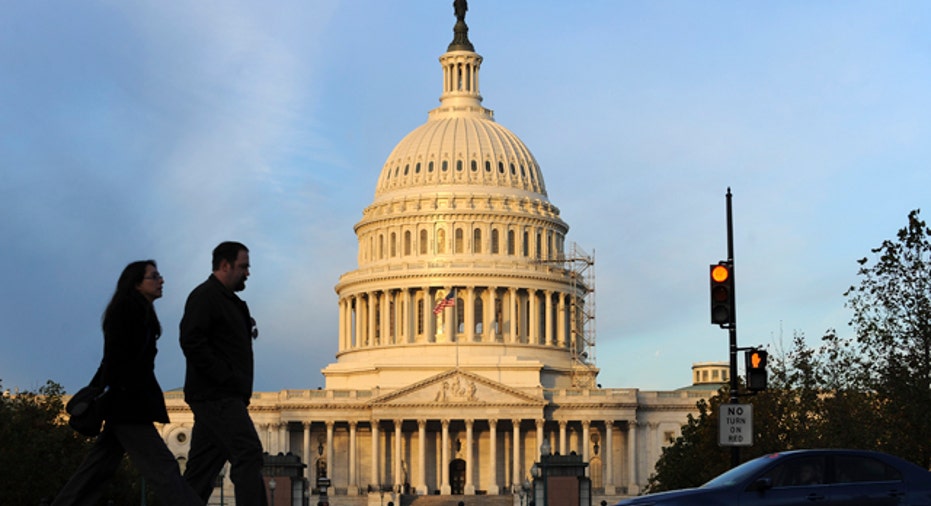House GOP's Tax Plan Draws Fire

Congressional Republicans are doing everything they would typically do if they were on track to release a major tax bill sometime soon.
But the GOP tax effort is still in a precarious state, weighed down by internal policy disagreements and external political turbulence.
Three pillars of the House's tax plan -- which each raise $1 trillion over a decade to pay for rate cuts -- are under assault. Business groups and Senate Republicans have been pouring buckets of cold water on the ideas that make the House plan add up.
President Donald Trump's administration, meanwhile, has released only a vague, one-page outline of tax goals, leaving it to Congress to work out the details. Optimistic talk of committee votes this spring have given way to discussion of action this year. And if a tax bill emerges, it will land amid a storm of investigations into Russian interference in the 2016 presidential campaign, which have swept up the Trump administration and distracted lawmakers.
"Members will lose their nerve to do controversial things as they instead focus on distancing themselves from the president and scrambling for their own political life," Jon Lieber of the Eurasia Group consulting firm wrote to clients this week. "A tax bill could be completely derailed by this, but either way can't come together until early next year."
Republicans, sounding optimistic, say they are still making progress. They are holding hearings, including one Thursday featuring corporate executives, with another three set for next week. They are speaking with senior administration officials. They are developing details behind closed doors. They are testing economic models to make their plans fit budget targets. And they are trying to inject new energy and urgency into their efforts.
"We can pick apart any piece of this, but the cost of delay is so important," Rep. Pat Tiberi (R., Ohio) said at Thursday's hearing, about the need for a major tax bill. "As the rest of the world has reformed and lowered rates and taken our jobs, we continue to let the perfect be the enemy of the good."
Even with Republicans controlling Congress and the White House, a major tax bill was never certain. Republicans agree on cutting tax rates and lightening the tax burden on U.S. companies' foreign earnings, but they split over whether they want a net reduction in tax revenue and they divide along regional and ideological lines on crucial details.
Still, they entered the year optimistic. House members worked from a detailed outline, the "Better Way" blueprint House Speaker Paul Ryan (R., Wis.) unveiled in June 2016. And they still sound positive about reshaping the tax system in 2017.
"President Trump is leading the charge for bold tax reform that will unleash the growth of jobs and paychecks nationwide," Rep. Kevin Brady (R., Texas), chairman of the House Ways and Means Committee, said Thursday. "Our committee is ready to answer that call."
To lower tax rates without adding to budget deficits, Republicans plan to bank on revenue created by economic growth and three big money-raising ideas: introducing a so-called border-adjustment tax proposal, scrapping deductions for business interest and repealing the state and local tax deduction for individuals.
Each of these measures faces sustained attacks from interest groups and fellow Republicans. None is sure to survive in the final bill, and there are no obvious revenue-raising alternatives in reserve.
Adding a border adjustment to the corporate tax -- taxing imports while exempting exports -- drew fierce blowback from retailers and Koch Industries Inc., the conglomerate run by billionaires influential in GOP politics.
Senate Majority Leader Mitch McConnell (R., Ky.) said this week the border-adjustment tax plan probably couldn't pass the Senate.
The same could be true for repealing the business interest deduction, an idea opposed by debt-dependent industries such as real estate, private equity and agriculture. Sen. John Thune (R., S.D.) said this week that the proposal would face an uphill fight in a Senate sensitive to rural interests. He is exploring a cap instead.
The House plan to repeal the individual deduction for state and local taxes has buy-in from the White House. But many House Republicans are objecting and there are enough of them to block the plan.
Such forces would have slowed the GOP tax plan under the best possible circumstances.
"Tax reformers may have to lower their ambitions," J.P. Morgan Chase economist Michael Feroli wrote this week. "Absent a backup plan, the slow demise of Ryan's Better Way program is revealing the tough road ahead to getting anything big done on corporate tax reform."
Democrats, meanwhile, say they are open to working with the administration but see little they like. Their complaint is that the GOP plans provide certainty about rate cuts for high-income households and businesses, and vagueness about benefits for middle-income Americans.
In addition to disagreements over the substance of a tax bill, its progress is likely to be slowed by other issues consuming Washington's time, attention and energy.
Republicans plan to pursue tax legislation after passing a health-care overhaul. While the House has passed a health bill, the Senate is just starting on its version.
Lawmakers also can't complete the tax bill until they adopt a budget, a process that will force them to confront deep divisions within the GOP over spending priorities and deficits.
The Russia investigations -- and related probes into Mr. Trump's campaign and his firing of FBI Director James Comey -- could bog down a tax bill as well. The more time and political capital Republicans spend on Russia, the less they have for tax policy.
"Raising an umbrella in a light rain might keep you dry and not impede your travels," said Sage Eastman, a former GOP Ways and Means aide. "But in a full-fledged tropical storm -- well -- you're going to get a little wet."
(END) Dow Jones Newswires
May 19, 2017 07:14 ET (11:14 GMT)



















